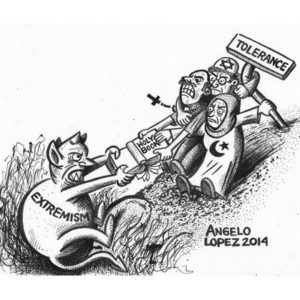The recent bout of terrorist attacks in Pakistan reminds us once again that it is one of the worst victims of terrorism perpetrated by religious extremist groups claiming their adherence to what they call the puritan Islam.
According to Global Terrorism Index the top 5 countries affected by terrorism include Iraq, Afghanistan, Nigeria, Pakistan and Syria accounting for 78 percent of global terrorism related deaths in 2015.
It is not only in Pakistan alone but the rise of religious extremism in India, Bangladesh, Myanmar posing real threat to minorities inhabiting these countries is a matter of concern for all peace-loving people of this region.
It seems that if effective counter narratives to the religious extremist forces are not developed and strengthened, the region will become a hot bed of terrorism and violence resembling the today’s Middle East. We should remember that the globalization has not only made the export of goods and services very easy but it has also made it easier to export ideas and narratives, problems and grievances. Therefore, an ideology of hate and bloodshed near ones’ borders must ring an alarm bell for all. The reign of terror unleashed in India by the self-declared cow protectors and other rightist groups, horrible attacks on minorities and independent bloggers in Bangladesh, genocide of Rohingyas in Myanmar by Buddhist extremists are all examples of marking the rise of ‘Majoritarian Right’ in South Asia.
The impending threat posed by the rise of these forces should not be underestimated as it has the potential of blowing into a major crisis of our time. There are signs of legitimization of these forces through a dangerous narrative of violence and counter violence which has already given birth to a kind of competitive terrorism in India.
The worst crime is that which is committed in the name of religion. It is unfortunate the violent forces in Pakistan are misusing Islam for legitimizing their barbarism and delegitimizing the democratic dispensation. The fight against terrorism in Pakistan is more ideological in nature than the military. Therefore, an Islamic narrative based on peaceful coexistence must be developed and strengthened to delegitimize these forces of evil. The best solution for developing such a narrative or discourse is to accept all existing sects among Muslims as the diversity within Islam and finding compatibility between Islam and democracy.
Mohibul Haque, Assistant Professor, Department of Political Science, AMU Aligarh


